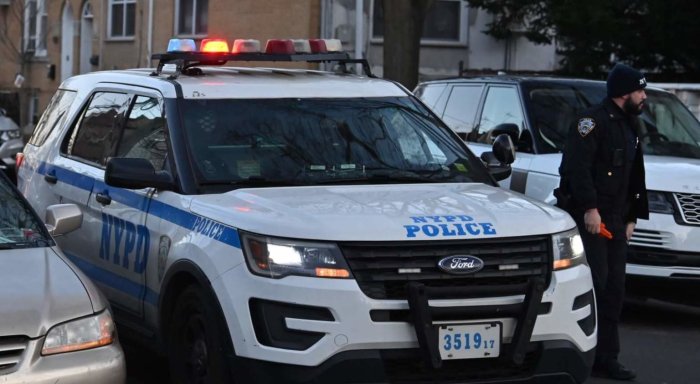By Tien-Shun Lee
With the war against Iraq in progress, the senior army instructor of the Junior Reserve Officer Training Corps at Francis Lewis High School said he was not planning on holding any special discussions with high-school cadets to address current events.
“We have nothing to do with that,” said Sgt. Richard Gogarty, one of four JROTC instructors who oversee the approximately 400 JROTC cadets at Francis Lewis. “We're just a high school like anybody else.”
Gogarty said the percentage of students who go on to join the military is probably lower among JROTC members than in the rest of the school because almost all JROTC cadets attend college and are more focused on what they want to achieve in the future.
“Basically, the program teaches how to be successful leaders and communicators,” said Gogarty. “There's no connection between the program and military service.”
Kaity Wan, 16, a JROTC cadet from Bayside said she was considering signing up with the military in the future, but had joined JROTC mainly to develop leadership skills and increase her self-confidence – assets that would help her in any future career.
“I'm not for the war. I'm against the war,” said Wan. “But in the Army you don't necessarily have to go to war. You can go into engineering, protecting the environment, maintaining the peace.”
Dressed in army green uniforms embroidered with “JROTC,” Francis Lewis JROTC cadets spent one class period last week standing at attention while a JROTC cadet leader inspected their uniforms and questioned them, one by one, on what they learned in class recently.
The weekly uniform inspection procedure is just one example of higher-ranking JROTC cadets being in charge of lower-ranking cadets – a practice that JROTC that Gogarty says is a cornerstone for building leadership skills.
“The program is set up like any type of a large corporation except instead of a CEO, they have captains, company commanders, battalion commanders, sergeants,” said Gogarty. “They learn how to organize, plan, communicate. You'd really be shocked at how well they do it.”
Just as they would in a company, higher ranking JROTC cadets often conduct meetings with committee members to plan events.
Events documented in this school year's scrapbook include a clothing and food drive, blood drive, parades, park cleanups, banquets and balls, group runs, fund-raising car washes and out-of-town trips.
“It gives you a lot of responsibility,” said Jake Diaz, 18, a JROTC cadet from Flushing. “It's almost like work experience. If you want to be the manager of a business, it's a great experience.”
As JROTC members, students are required to take one JROTC class per semester. Curriculum for JROTC classes includes history, physical fitness, communication skills, leadership, finance and health.
Outside of class, many JROTC cadets join extracurricular JROTC groups such as the drill team, the Raiders athletic team, the drum corps and the honor guard.
This year the drill team won 10 out of 12 first place trophies in a drill competition among Long Island, New York City and southern New York state schools. The honor guard opened for a New York Knicks basketball game in Madison Square Garden in March, and the drum corps along with other Francis Lewis JROTC formed the largest marching unit in the Veteran's Day parade last November.
“I learned about JROTC the first day I came here,” said Peter, Ostojic, 14, a freshman JROTC. “Its motivation is to make people better citizens and I wanted to be a better citizen.”
Gogarty said his personal feeling about the war against Iraq is that it is regrettable but necessary.
“I support the troops and my heart goes out to them,” he said. “It's not something I look forward to them doing, but it's probably necessary. I'll be watching CNN tonight along with everybody else.”
Reach reporter Tien-Shun Lee by e-mail at Timesledger@aol.com, or call 718-229-0300, Ext. 155.

































